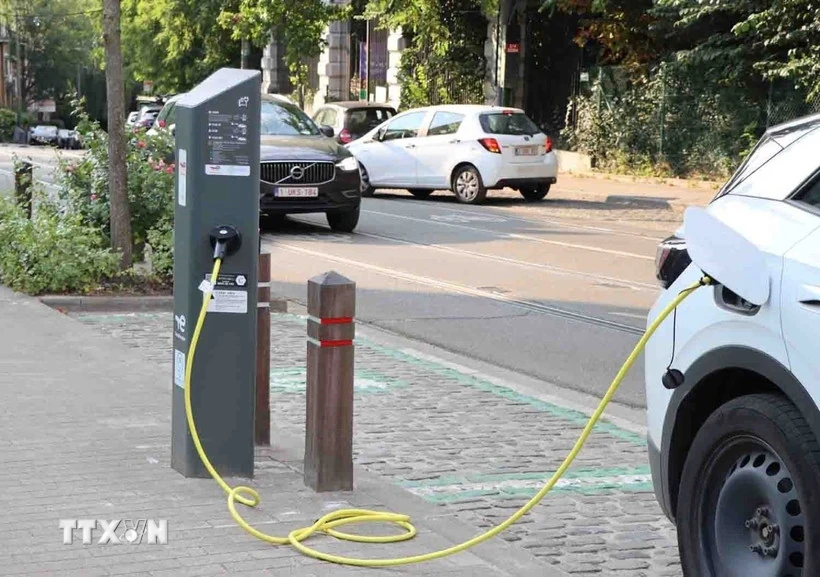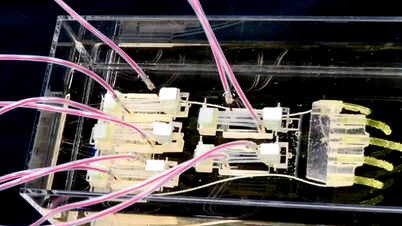An electric car charging station on Wolvendael Street, Uccle district, Brussels (Belgium). (Photo: Huong Giang/VNA)
According to a VNA correspondent in Brussels, this is not only a symbolic milestone but also proof that electric transport is gradually becoming a popular and reliable choice for Europeans, even during peak travel times such as summer holidays.
According to EV Belgium, the charging network is growing at an unprecedented pace, thanks to concerted investment from both the public and private sectors. With more than a million public charging points in operation, including around 100,000 fast or ultra-fast charging stations, electric vehicle users can now hit the road without worrying about range or access to energy.
In fact, modern super-fast charging stations can recharge most of the battery in less than 20 minutes, the same time as a coffee break along the way. This makes long-distance electric vehicle travel less of a challenge and more enjoyable and convenient than ever.
In Belgium, charging infrastructure is also making great strides. The public charging network now reaches nearly 100,000 points nationwide, making Belgium one of the best-equipped countries in the European Union (EU).
Notably, of these, more than 90,000 charging points provide standard power, serving the need for overnight charging or charging at the workplace. The remaining 7,000 points are fast charging stations, with the ability to meet flexible mobility needs. Wallonia, once considered a laggard in the electrification of transport, has made a clear breakthrough when the number of fast charging stations here doubled in just one year.
Along with the development of infrastructure, the number of electric vehicles is also expected to skyrocket in the coming time. EV Belgium predicts that by the end of the decade, there could be around two million electric vehicles on Belgian roads. To cater for that scale, the charging network needs to continue to expand not only in quantity, but also in coverage density and connectivity.
This synchronous development is seen as a prerequisite to ensure that electric vehicles can sustainably and effectively replace traditional fossil fuel vehicles.
It’s not just the numbers that are improving, either: the quality and transparency of the charging experience is also improving significantly. Thanks to the EU’s AFIR (Alternate Fuel Infrastructure) regulation, which comes into effect in 2024, charging station operators are required to meet strict standards for fare display, payment methods, and service accessibility.
Users can now pay simply with a bank card, without having to use separate apps or membership cards as before. Information about charging capacity, estimated time and price is also made public, helping to avoid unpleasant surprises when using the service.
This is seen as an important factor in boosting consumer confidence in electric vehicles, while removing barriers that once existed for those who were hesitant to consider switching vehicles.
In addition to infrastructure and regulations, charging technology is also making significant strides. New electric vehicles are being designed to be compatible with super-fast charging stations without sacrificing battery life, one of the most common concerns among consumers.
The combination of advanced charging technology and new generation vehicle compatibility helps shorten charging time while enhancing user convenience in all travel situations.
Europe reaching the one million charging point milestone is not only a milestone in infrastructure, but also a strong affirmation of the region's commitment to building a sustainable, equitable and zero-emission transport system.
As charging an electric car becomes as easy as filling up with petrol, and the user experience continues to improve, the transition to electric vehicles is no longer a thing of the future, but is happening today, on every road in Europe.
“If in the past, electric vehicles were only the choice of pioneers, now they have become a smart and feasible choice for the majority,” emphasized the representative of EV Belgium.
With the current development momentum, charging electric vehicles will become faster, cheaper and simpler, contributing to bringing Europe closer to the goal of carbon neutrality and a green, clean and sustainable economy for future generations./.
According to VNA
Source: https://baothanhhoa.vn/1-trieu-diem-sac-xe-dien-da-duoc-lap-dat-tren-toan-chau-au-255797.htm
































![[Photo] Signing of cooperation between ministries, branches and localities of Vietnam and Senegal](https://vphoto.vietnam.vn/thumb/1200x675/vietnam/resource/IMAGE/2025/7/24/6147c654b0ae4f2793188e982e272651)








































































Comment (0)